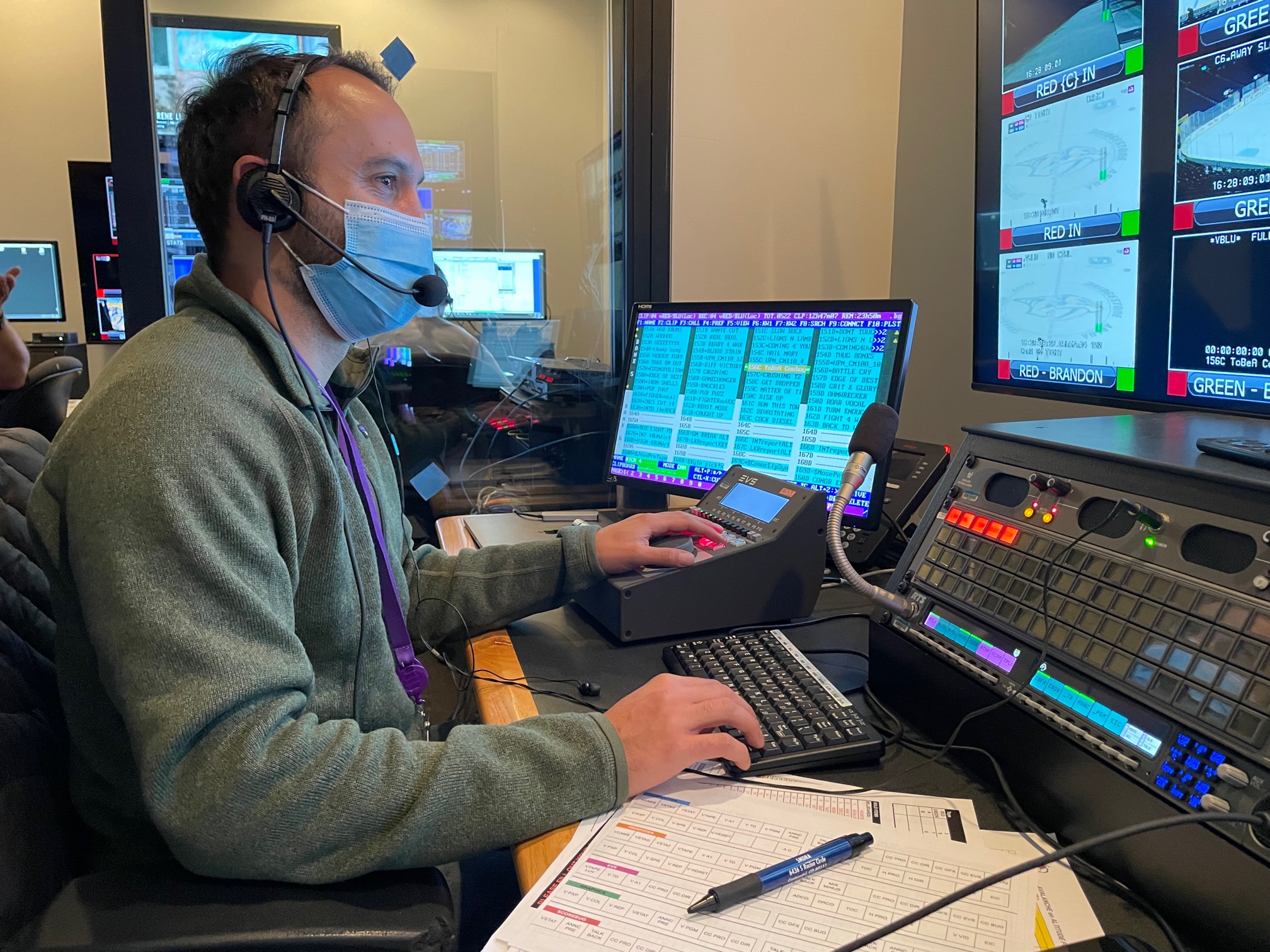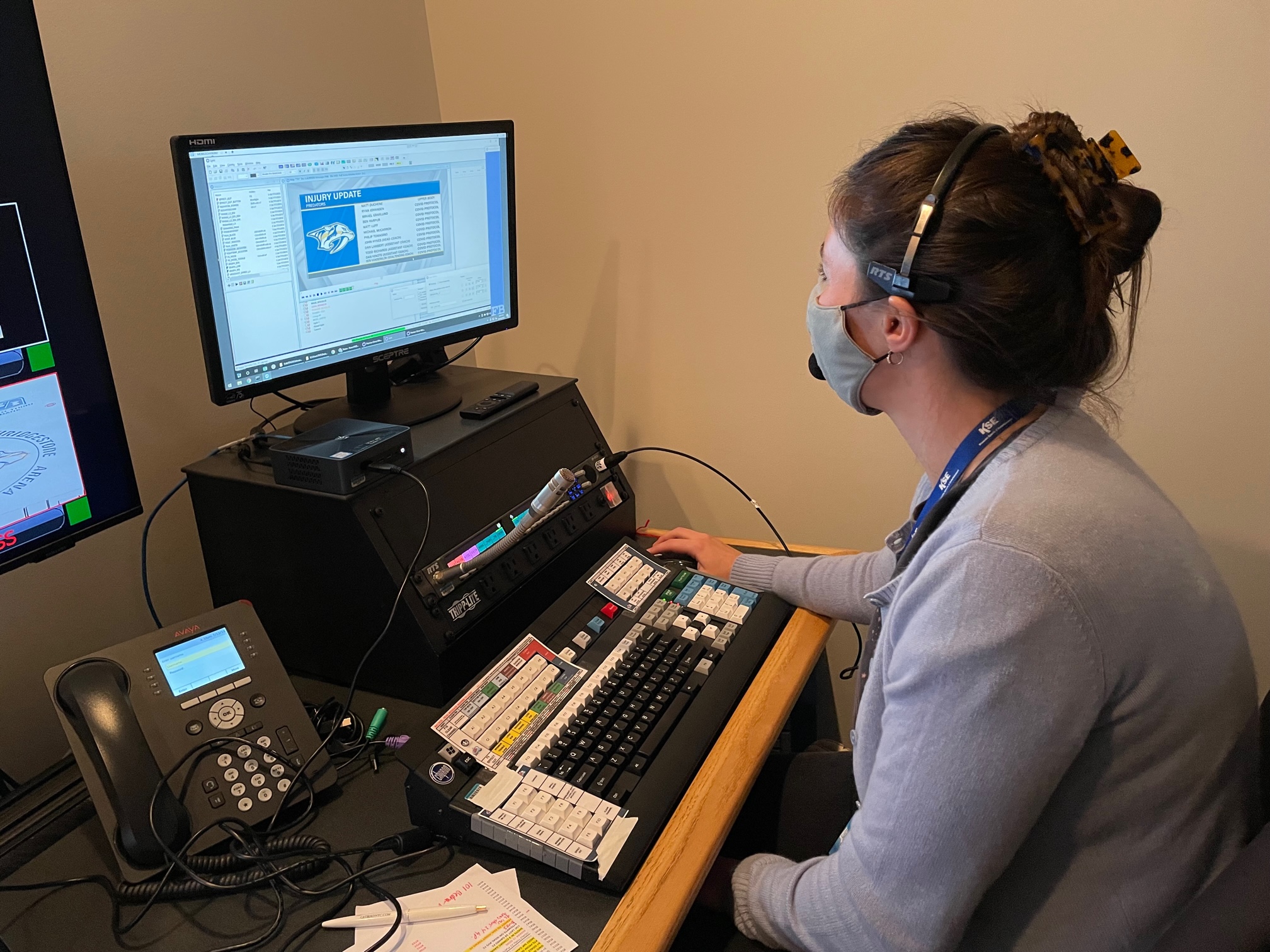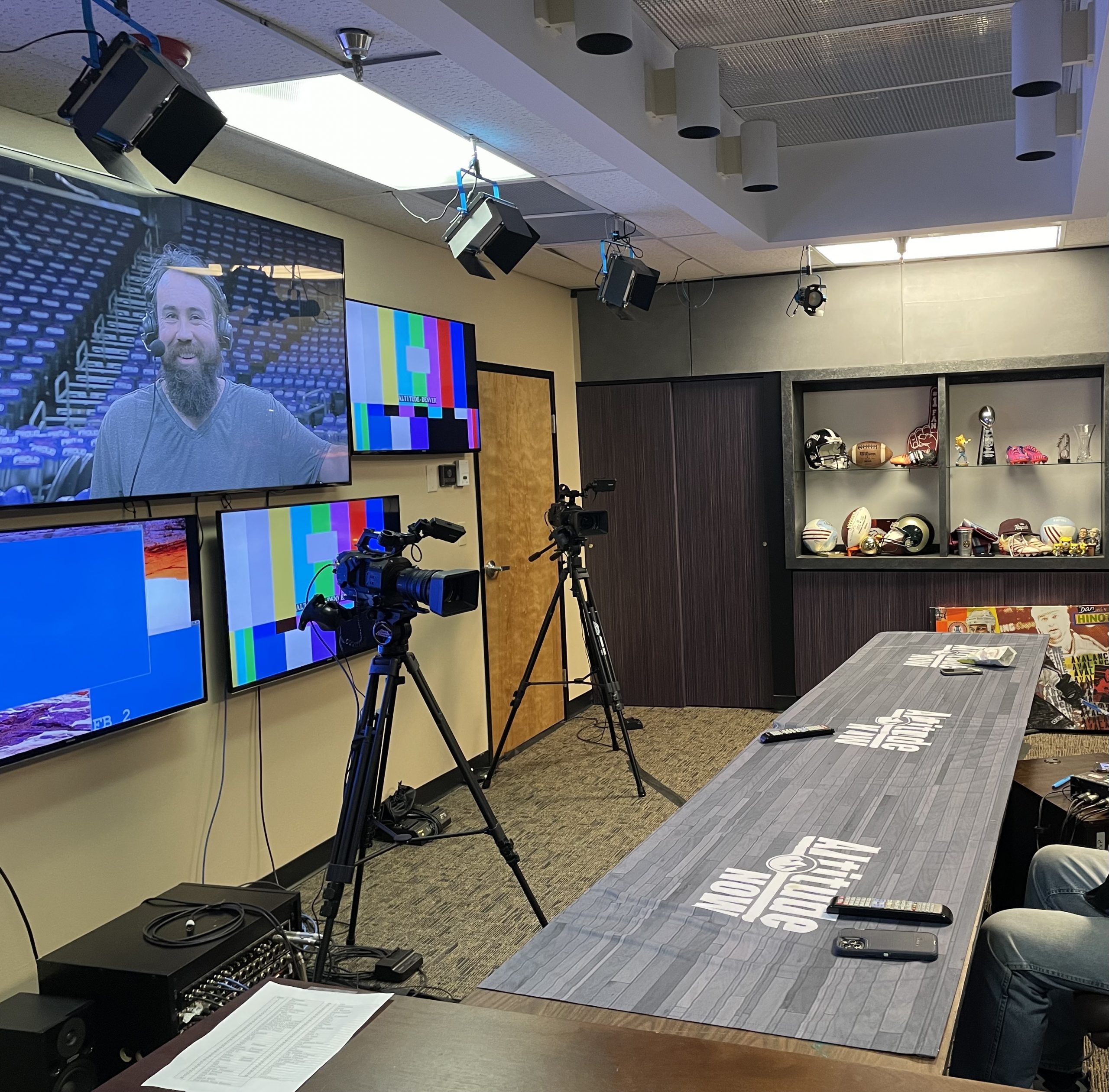Altitude’s Kroenke Network Operations Center Becomes Multi-Purpose Centralized Production Hub
Several different onsite, remote models are available to the RSN
Story Highlights
Over the past half decade, the centralized-production revolution has brought more and more operations and personnel back to the broadcast center in an effort to reduce the onsite footprint at remote productions. With the trend accelerated by the pandemic, regional sports network Altitude Sports & Entertainment is fully embracing centralized production in a variety of ways at the KSE Network Operations Center (KNOC) just south of Denver.
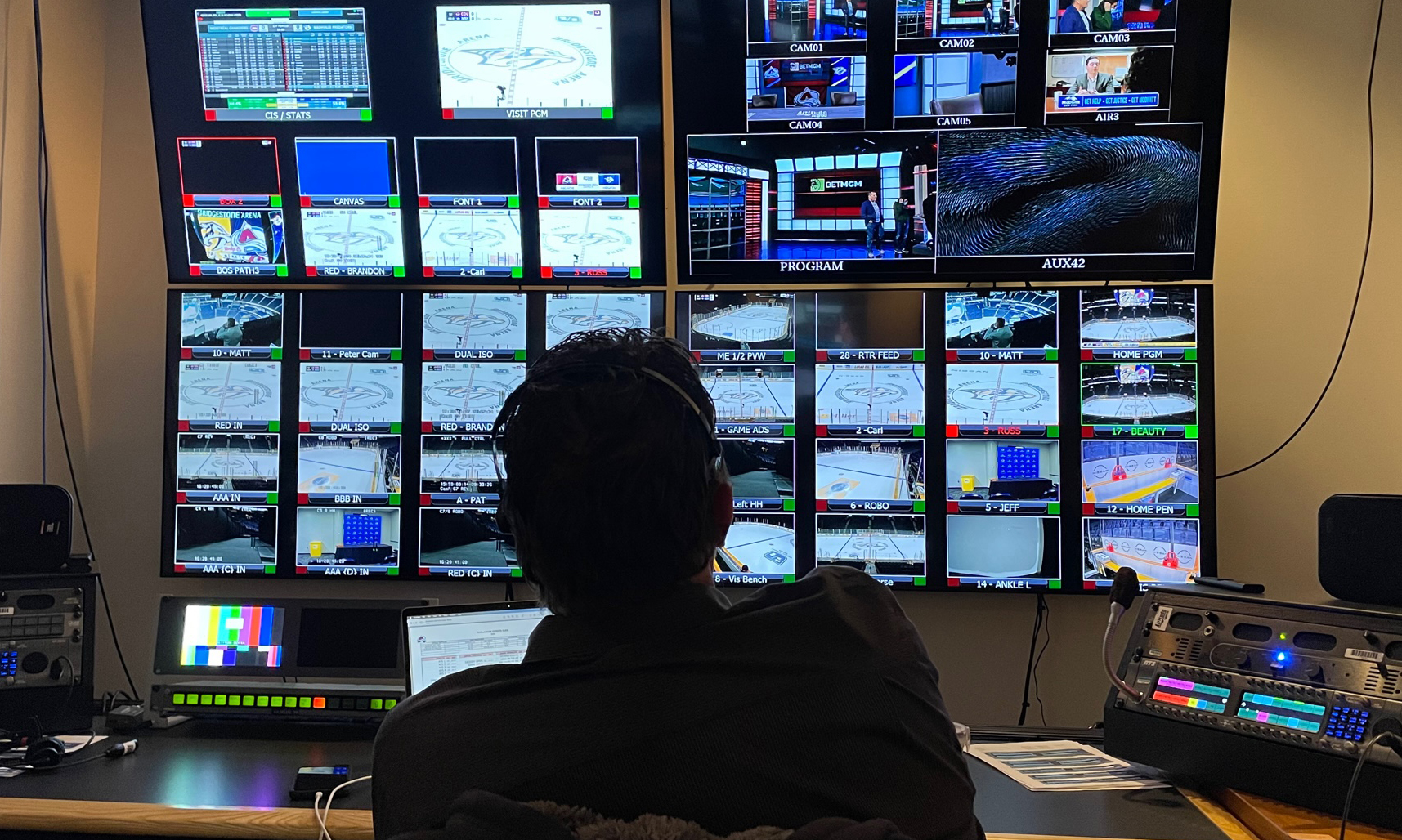
The Cloud Control director has access to all feeds via a multiview at KSE Network Operations Center (KNOC).
“[Here’s] what I found to be the most important thing since the pandemic started: flexibility,” says Tim De Lay, operations manager, Altitude Sports & Entertainment. “No longer are we held to just one method of doing productions. We have several, and that gives RSNs (like us) flexibility as we work on our budgets going into the next season. I think most folks in tech ops agree that the pandemic has pushed us faster into our future. What we thought was five years out is now our present.”
Bustling Facility: Much More Than Just Avalanche, Nuggets Broadcasts
Located in Centennial, CO, about 17 miles south of Denver’s Ball Arena — home of the Denver Nuggets, Colorado Avalanche, and Colorado Mammoth — KNOC houses the Altitude and Outdoor Sports Group Production teams as well as KSE Network Operations, Engineering, Broadcast Services, and Traffic Departments.
As Altitude’s primary studios and production facilities — in addition to serving as the main master-control center for KSE properties Altitude, Outdoor Channel, Sportsman Channel, and World Fishing network — KNOC also supports more than 50 editorial and media-prep workstations, almost all of which have been functioning fully remotely for the past two years.
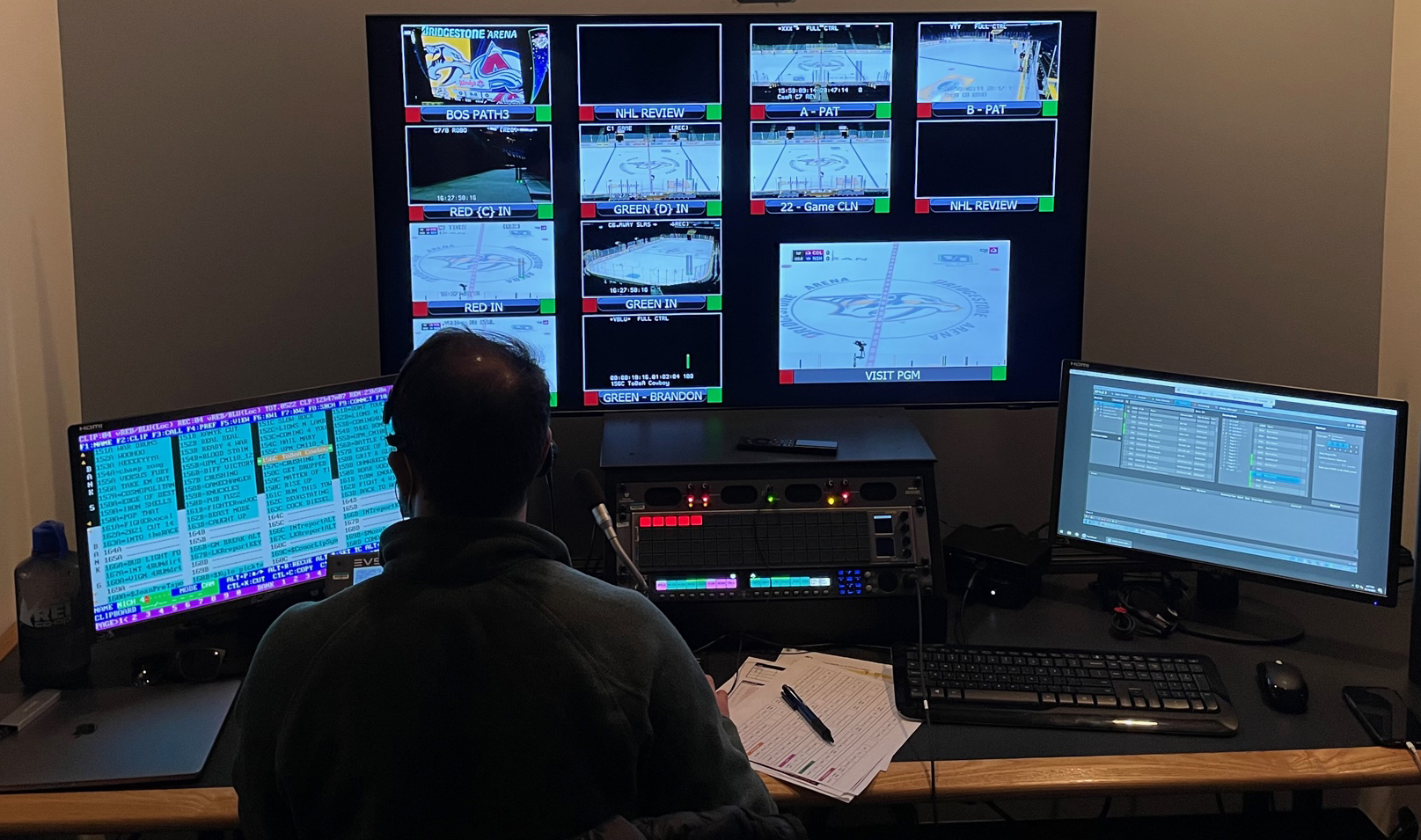
Producers and directors see the multiview monitor wall and have RTS communications as if they were in the truck.
The KSE team produces a variety of broadcasts using its studio and new remote-broadcasting booths (converted conference rooms) in Centennial. The broadcasts include Nuggets and Avalanche pregame/postgame/intermission/halftime shows, Altitude’s You Bet Tonight sports-betting show (launched last fall), Colorado Rapids (MLS team also owned by KSE) away games, and season-preview and wrap-up shows.
In 2020, after the pandemic arrived, Altitude produced host feeds for away RSNs from Ball Arena and Nuggets and Avalanche away host productions from KNOC. In December 2021, the RSN launched its first Cloud Control room there in collaboration with Mobile TV Group. In addition, broadcasting booths there serve the remote-radio-call needs of Altitude Sports Radio’s KKSE-FM for Avalanche, Nuggets, and Rapids away games.
In addition, every year, Altitude Sports also produces the three Los Angeles Rams (also part of the Kroenke Sports empire) preseason home games, which air on KABC and an affiliate network throughout the western U.S.
On top of all that, the KNOC has also spun up remote systems in Centennial to support KSE sibling Skycam, as well as NBC’s Sunday Night Football. According to Dave Zur, SVP, ops and engineering/GM, KNOC, KSE/Altitude, soon after the initial shock of the pandemic subsided, KSE COO/CTO, SkyCam division, Stephen Wharton reached out to Zur regarding installation of a Skycam remote-control and network-ops center at KNOC as a precautionary measure.
“We launched the SkyCam remote operation in fairly short order,” says Zur. “The idea being that, if Skycam operators couldn’t get to or into the venues, we could provide operators to fly out of our facility. Even as a complete novice test pilot, I was able to remotely fly the Wildcat at the Meadowlands with pretty darn good results. It was a tremendous eye-opener.
Through Wharton, this led to a request from NBC Sports Senior Director, Technical Operations, Keith Kice in November 2021. Zur and his team set up a remote EVS configuration that was used through the Sunday Night Football regular season and in NBC’s postseason coverage (including the Super Bowl).
“Not only was it a blast to work with family, old friends, and new ones,” says Zur, “it forced us out of our comfort zone and outside of our facility walls to interface with multiple vendors and solve the challenges of integrating brand-new live workflows. While there are clearly pros and cons, we hope to do much more of this. With the wide skillsets of the freelance crew here in Denver, we’ve actually considered taking the model forward and creating what could be a regional remote-ops hub.”
Pandemic Punch: How Altitude Adapted to Unprecedented Challenges
In mid March 2020, having essentially shut KNOC productions down like the rest of the industry, Altitude quickly found a way to stay connected to its viewers and fans via a Zoom-produced show called Sports Social, which aired on both the linear network and Altitude’s social and digital outlets. The show, which launched March 31, just two weeks after the shutdown, allowed talent working from home to interview coaches, players, and local health officials from Denver and environs.
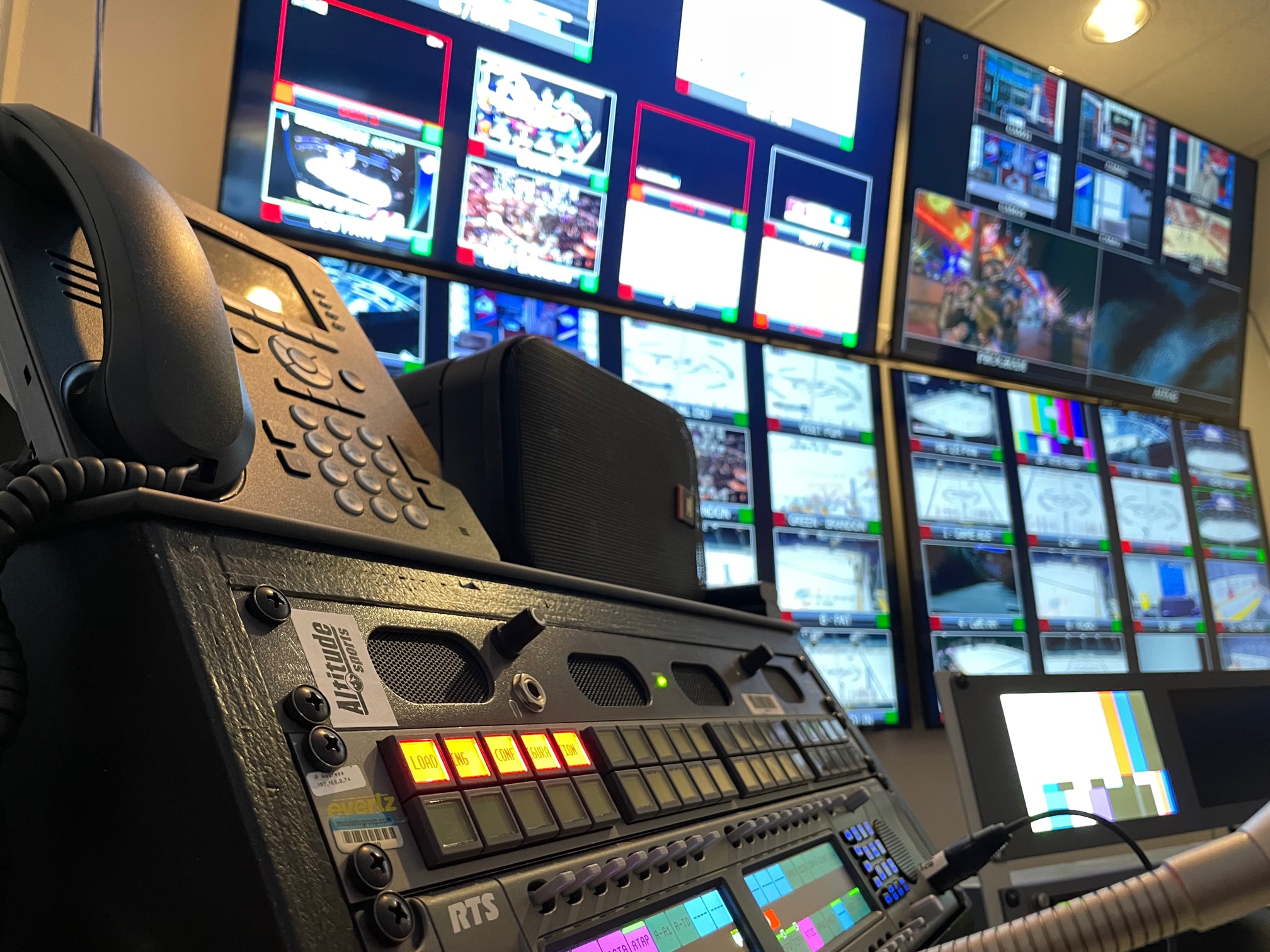
For Cloud Control shows, all RTS intercoms are tied directly into the mobile unit onsite, allowing the team back home to feel as if they were in the truck.
When the NBA and NHL restarted later that summer, Altitude used its facilities at Ball Arena to deal with any conflicts between Nuggets and Avalanche schedules.
“We were able to have what we called an ‘empty venue’ production: we had our production crew doing Nuggets away games — truck, talent, and all aspects of the production — from the empty space,” De Lay explains. “We had the run of the joint, even having our jumbotron lowered down close to the court as a huge screen [on which] to place anything we wanted to help with the production and provide a great backdrop with our talent in the foreground.”
During that time, Altitude also morphed its studio facilities, which were built solely for studio productions, into a quasi–production-truck model. In addition, the RSN transformed two conference rooms into broadcast booths to allow announcers to call away games from KNOC when necessary.
“The KNOC Engineering Group, led by Dave Zur, did an amazing job of reconfiguring the plant to accommodate the plethora of new asks we had coming from the production side,” says De Lay.
“From an engineering perspective,” says Zur, “the hard part was trying to stretch our resources and adapt systems to make a purpose-built multichannel origination facility act like a remote truck. Without the basics — audio break-away production router, truck- specific audio, monitoring and tally configurations — it was quite a challenge to layer it all in and engineer it, on top of the daily load of 24/7 playout.”
The engineering team worked with The Switch to pull in four feeds from Altitude’s away games for the Avalanche and eight feeds from its connections at Ball Arena’s NBA HSAN (high-speed arena network) for productions during the remainder of the 2020-21 season.
When the 2021-22 season began, Altitude found itself with three production models for away broadcasts: traditional dual-feed (home RSN with a full show and sharing some resources with the away RSN), full side-by-side (dedicated mobile unit for each RSN), world feed (home RSN essentially delivering a clean program feed to the away RSN).
“Having these multiple options,” says De Lay, “brings up a whole new set of logistical stresses, as our groups are continually changing from one model to another. This is definitely a transitional year as we look at how we can find the balance in the budget and keep our production groups plugged-in to our teams on the road.”
Cloud Control Joins the Party: The Next Chapter of the Dual-Feed Model
In December 2021, Altitude added yet another production-model option with the launch of its own MTVG Cloud Control room at KNOC. Altitude’s first Cloud Control production was the Avalanche at Nashville game on Dec. 16, 2021.
“Though the Avalanche lost that game,” says De Lay, “it was nice to have a win on the technology side, having taken the first steps towards a newer way of producing a game. Cloud Control opens a new door for future innovation and gives us another production tool in our broadcasting toolkit.”
Mobile TV Group’s Cloud Control model allows the bulk of Altitude’s Denver-based traveling group to remain at the broadcast center and use control panels to remotely control the technical facilities in the mobile unit at the venue. MTVG Cloud Control rooms are up and running at RSN facilities across the country, including the majority of Bally Sports Regional Networks and several others.
Throughout the summer of 2021, Altitude worked with the Centennial-based production-unit provider and MTVG Chief Operations Officer Nick Garvin on plans to launch Cloud Control. Even before that, MTVG had partnered with Altitude on the first-ever demo of Cloud Control in May 2020.
Notes De Lay, “Their facility being just down the street made it very easy for us to envision what things would look like as we walked through potential options.”
With most editors working remotely due to the pandemic, Zur and his team were able to convert three connected edit bays into an ideal space for the Cloud Control room. MTVG created five Cloud Control stations for the operators at KNOC and delivered/installed them in a day.
When Altitude produced its first Cloud Control Avs game and Nugs game, MTVG EICs Travis Swenson and Troy Carsten from the provider’s 43FLEX mobile unit came in and oversaw the production at KNOC to help make the RSN’s small CC crew feel more confident with a new technology.
“It took us a game or two with the Cloud Control team to learn and define some communications,” Zur notes. “For example, while the CC production staff was physically in our building, technically, they and their workflows were not; they were still in the truck, wherever that may be. So the CC producer’s saying ‘It’s good here’ initially took a few extra beats to clarify and digest.”
For Cloud Control Dual Feed shows, Altitude is using the same MTVG truck (43FLEX) and crew previously used for onsite dual-feed away shows, minus four of its core traveling personnel. The RSN will travel either the main producer or the graphics operator to assist setup of its TV-graphics scorebox, Chyron Mosaic graphics, and EVS replay servers. In the Cloud Control room at KNOC are the director and the EVS, scorebox, and graphics operators. Announcers are typically onsite for Cloud Control Dual Feed shows (although they usually call world-feed shows off-monitor from KNOC). In addition to graphics operators, the AVs are now deploying the EVS operator onsite for a few games, and that allows producers to be in the Cloud Control room.
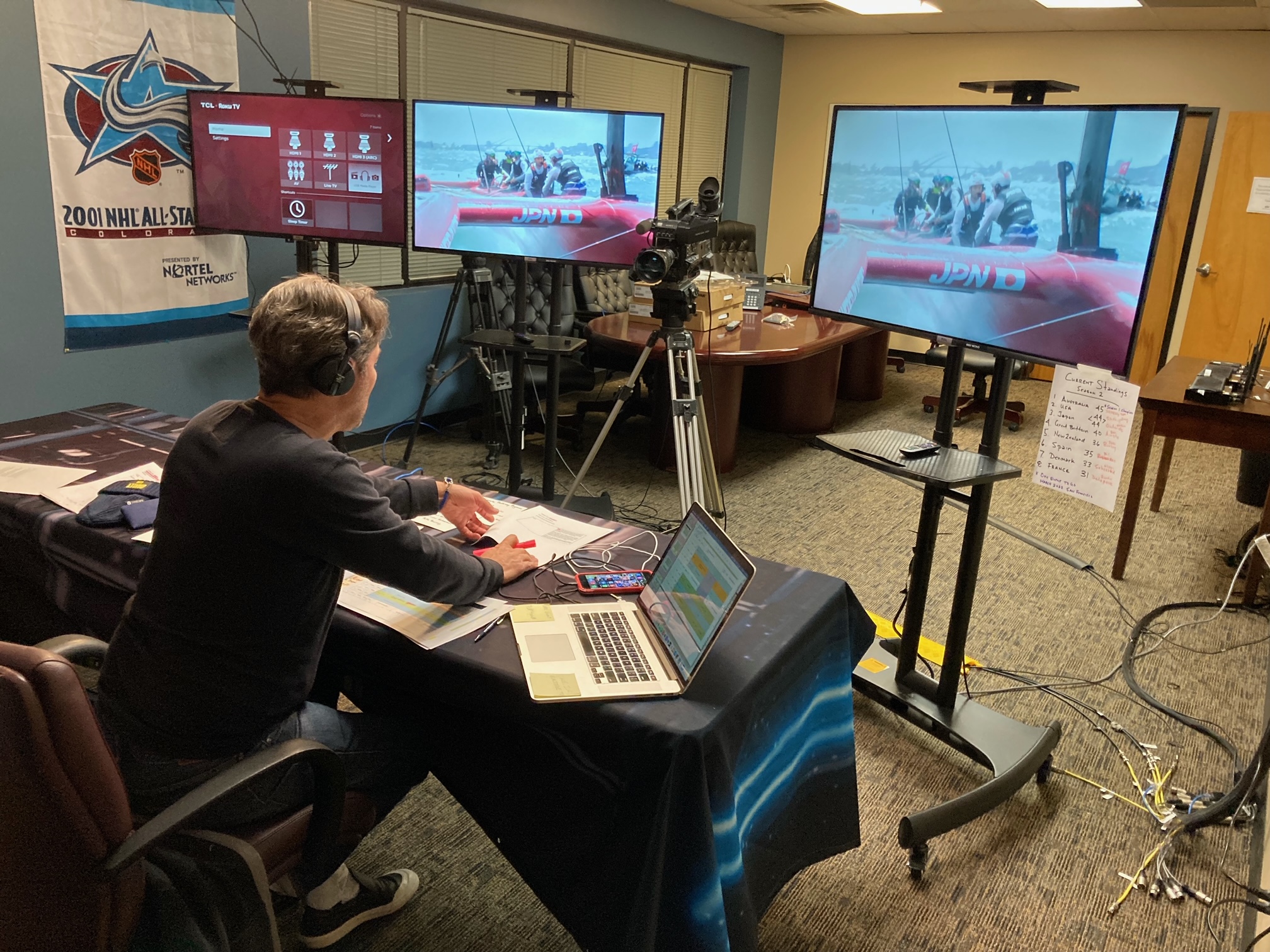
In addition to Nuggets and Avalanche productions, KNOC’s broadcast rooms can serve third parties: for example, when broadcast booth 2 was used for a SailGP production in late 2021.
A rack that MTVG installed at KNOC houses several Haivison decoders and encoders, giving Altitude four monitor walls and one inbound program feed. They also encode a signal that can be sent to the truck via a router controlled by the producer for sales reads and other content for announcers.
Even when not physically onsite, producers and directors see the multiview monitor wall and have RTS communications as if they were in the truck.
In addition to budgetary savings, Cloud Control offers significantly more control of the show than the world-feed model. Even so, De Lay acknowledges that it also creates new challenges for Altitude’s production team.
“Our Cloud Control crews that work out of KNOC continue to strive for the best production possible,” he says, “and I’m aware that Cloud Control takes them out of their comfort zone, disconnecting them physically from being onsite. However, somewhere in the middle is a balance for a hybrid of the new and the old methods to get a post-pandemic broadcast. I think that this Cloud Control technology is the perfect steppingstone into the future of how we do away broadcasts in seasons to come.”
Altitude has completed two Cloud Control Dual Feed Avalanche game productions (with five more planned this season) and nine Nuggets games (with an additional five on the docket.
“Our production team has approached Cloud Control with both [interest] and caution,” says Matthew Krol, VP/GM/Executive Producer, Altitude Sports & Entertainment. “I liken this to the early days of dual feeds and figuring out the best way to get the production done without losing the broadcast quality that fans expect. It takes some getting used to, and each city brings on a new wrinkle, but so far it has been a success.
“The world feed worked well in the pandemic, but it limited our storytelling,” adds Krol, who returned to Altitude in December 2021 after two years away and is enthusiastic about how KNOC had been transformed. “With Cloud Control, we truly have regained control of the broadcast, with the usual amount of cameras and sources we would see in a traditional dual feed. It’s great to have the assets we need back in our hands to put the best broadcast on the air that we possibly can.”
Looking Ahead: 2022-23 Season and Beyond
With operations for the current NBA and NHL seasons constantly evolving, De Lay looks forward to next season, when his team can consider the schedule in its totality and decide what flavor of production is best-suited for each road trip.
“Come 2022-23,” he says, “I think we will again use all of these production types, both old and new, but have a much better handle on the technologies to make the experience for our production crews seamless.
“The pandemic showed us that we can do a remote broadcast,” he continues, “and Cloud Control is a hybrid version of that. As our IT infrastructures continue to expand, so will our remote models. The bigger the data pipe, giving less latency, the more the ability to have us all sitting on our couches someday making television.”
